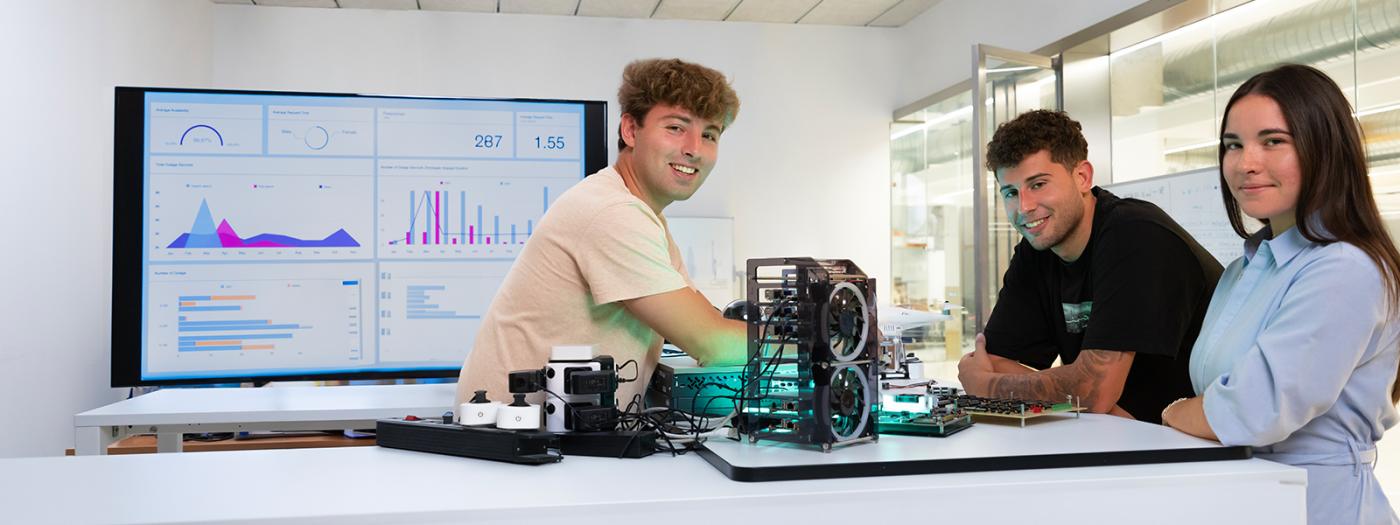This subject introduces students to the current method of developing web applications of any size. They will learn which the current development environment for these applications is and will practice with them every day. Also, they will analyze the state-of-the-art technologies of the sector with the aim of incorporate them in the student´s curriculum. Students must be able, once they have passed this subject, to create their own Internet programs and business and to work in any field related with the web environment. By the other hand, it is worth to mention that important web-development companies collaborate with this subject, making that its content is state of the art in the sector.
Titular Professors
Professors
In order to course this subject, it is recommended that the student has advanced knowledge of Object-oriented Programming and basic notions of database and SQL language, HTML, CSS y JS.
The main objective of Web Projects program is to train students to develop applications. It is expected that they discover how to program in this field and which the current technological trends are. The subject´s content table is reviewed each year to keep it the most up to dated as possible. The objectives to acquire in this subject are: 1. Have knowledge of current technologies used in Internet. 2. Ability to design web applications and databases. 3. Ability to analyze project requirements and plan the best strategy to carry them out. 4. Acquisition of group work skills. 5. Skills to find information in foreign languages through the network. 6. Ability to apply theoretical knowledge into practice. 7. Self-learning. 8. Understand all aspects concerning to the exercise of their profession and the need for lifelong learning.
Preliminary content - Important concepts of the web world. - Web infrastructure display. Seminar´s contents: The content of the seminars may vary depending of the latest trends, but includes: - Installation and use of a web development framework - Learn to use a SVN - Introduction to PHP and to the development pattern MVC - Analyze deeply in PHP. Heritage - Database and relational model review - CodeIgniter - Web template system - HTTP codes and re-directions - SEO concepts - Performance and logs - Hosting and domains
This subject is taught with an on-campus methodology. It consists in three one-and-a-half sessions during the second semester of each course. Because its characteristics, this subject is mostly practical, it doesn´t have a standard table of contents, but it is divided in two knowledge areas. There are two kinds of classes: Seminars: In these classes, students learn the necessary concepts to apply them later during the practical sessions. These are classes where students are able to interact and explain their points of view. Practical classes: Students will apply the concepts learned during the seminars in the different exercises and practices set up along the semester. The subject will have more practical classes when students have achieved more theoretical concepts. In other words, at the beginning, there will be more seminars that during the semester will disappear and give place to the practical sessions in order to apply the learned concepts. It is recommended that students come to classes with a laptop.
The student´s evaluation is principally done through the following: Works Exercises Practices Mid-term exams Final exam The subject´s final evaluation takes into account the previous concepts. The influence of each one of those in the final grade will be exposed during the first day of class.
Considerations: To pass the subject: o The grade FG (no matter how it is computed) must be >= 5 to pass the subject. o The grade obtained during the Final Evaluation phase should be >= 4 to compute the FG2 or FG3. o The Project grade must be >= 5 to pass the subject. Deliveries of the Project after the first delivery date are considered extraordinary delivery and the maximum grade will be 7. o There will always be a Project Interview. Failing the Project Interview implies that the student has not completed the Project and the student must take up the next Final Evaluation phase and retake the Project Interview. Each student can only be interviewed once per call. The subject has no midterm.
Practical Web 2.0 Applications with PHP Quentin Zervaas Apress, 2008 Building Scalable Web Sites: Building, Scaling, and Optimizing the Next Generation of Web Applications Cal Henderson O´Reilly, 2006
Pro PHP: Patterns, Frameworks, Testing and More Kevin McArthur Apress, 2008 PHP Objects, Patterns, and Practice Matt Zandstra Apress, 2008
